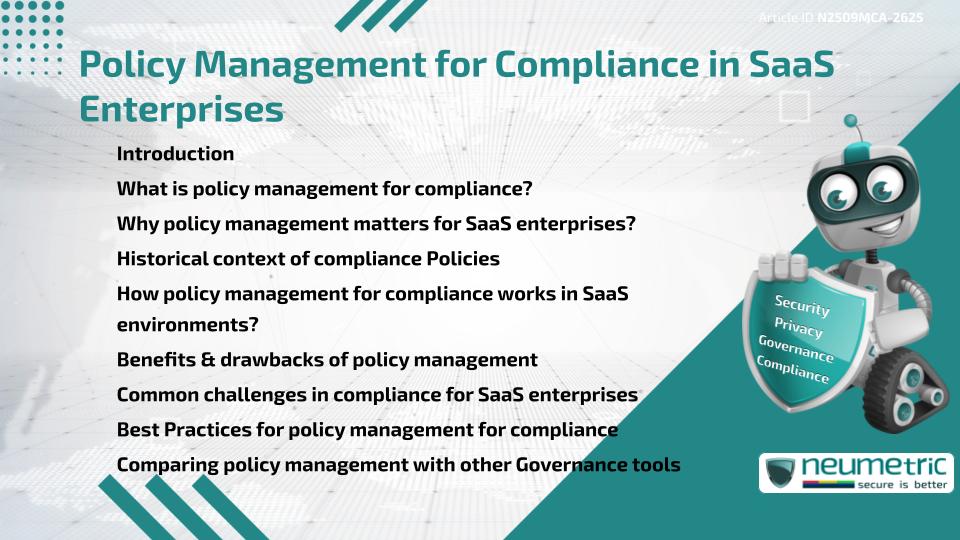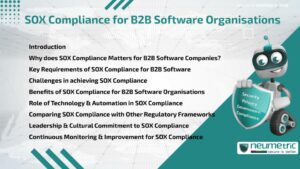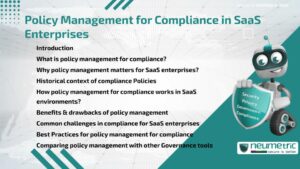Table of Contents
ToggleIntroduction
Policy management for compliance is a cornerstone of Governance in Software as a Service [SaaS] enterprises. As these Organisations operate in cloud-based environments, regulatory requirements & Industry Standards demand structured & consistent Policies. Policy management helps SaaS enterprises maintain accountability, reduce Risks & demonstrate compliance with laws. This article explores the meaning of policy management for compliance, its importance, historical development, challenges & Best Practices for SaaS enterprises.
What is policy management for compliance?
Policy management for compliance is the process of creating, implementing & monitoring rules that align Business Operations with regulatory & legal obligations. In SaaS enterprises, these Policies guide data handling, user access, security practices & operational behavior. Much like a roadmap ensures travelers stay on course, compliance Policies keep Organisations aligned with external requirements.
Why policy management matters for SaaS enterprises?
SaaS enterprises operate in highly regulated environments, from Data Privacy laws to sector-specific standards. Policy management for compliance ensures these businesses can prove they are meeting obligations. For example, it helps Organisations comply with Privacy frameworks & demonstrate to clients that security is embedded in everyday practices. Without effective Policies, SaaS enterprises Risk legal penalties, reputational damage & operational disruptions.
Historical context of compliance Policies
Policy management is rooted in corporate Governance practices that date back to the early twentieth century. Initially focused on Financial accountability, Policies evolved to include workplace safety, Privacy & Information Security. With the rise of SaaS & cloud computing, compliance Policies expanded to address digital Risks, international regulations & cross-border data transfers.
How policy management for compliance works in SaaS environments?
In practice, policy management for compliance involves drafting clear Policies, communicating them to staff, monitoring adherence & updating them as regulations change. SaaS enterprises often use automated tools to manage Policies, track compliance status & generate reports for auditors. For example, a policy may specify how Customer Data should be encrypted & Monitoring Tools can check whether systems follow that rule.
Benefits & drawbacks of policy management
Effective policy management for compliance offers benefits such as consistency, improved accountability & reduced legal Risks. It also strengthens Client trust by showing commitment to Governance. However, drawbacks include the administrative burden of maintaining Policies, the complexity of adapting to global regulations & potential staff resistance to strict rules.
Common challenges in compliance for SaaS enterprises
SaaS enterprises face unique challenges in compliance management. These include:
- Rapidly changing international regulations
- Complex cross-border data laws
- Aligning Third Party vendors with Compliance Requirements
- Ensuring staff understand & follow Policies
Addressing these challenges requires strong leadership & robust technological support.
Best Practices for policy management for compliance
SaaS enterprises can improve policy management by following Best Practices:
- Involve cross-functional teams in drafting Policies
- Automate monitoring & reporting
- Regularly review & update Policies
- Provide clear training & awareness programs
- Align vendor practices with enterprise Policies
These steps help create a culture of compliance & reduce Risks.
Comparing policy management with other Governance tools
While Audit systems & Monitoring Tools focus on detecting & reviewing activity, policy management for compliance sets the Framework that guides behavior. Policies act as the foundation of Governance, while other tools serve as enforcement or validation mechanisms. Together, they create a comprehensive approach to compliance.
Takeaways
Policy management for compliance is essential in SaaS enterprises. It ensures accountability, supports regulatory alignment & provides a Framework for secure & ethical operations. Despite challenges, applying Best Practices can help SaaS Organisations balance regulatory demands with operational efficiency.
FAQ
What is the main goal of policy management for compliance?
The goal is to ensure that SaaS enterprises align their operations with legal & regulatory requirements through structured Policies.
How does policy management benefit SaaS enterprises?
It reduces Risks, improves accountability & builds trust with regulators & clients by showing a commitment to compliance.
What challenges do SaaS enterprises face in compliance management?
Challenges include complex global regulations, vendor alignment, staff training & adapting to frequent regulatory updates.
Can policy management for compliance be automated?
Yes, many SaaS enterprises use automated platforms to track compliance, update Policies & generate Audit reports.
How often should compliance Policies be updated?
Policies should be reviewed regularly, at least annually & updated whenever regulations or business practices change.
What role do Employees play in policy management?
Employees must understand, follow & apply compliance Policies in their daily activities to ensure organisational success.
Is policy management for compliance only for large SaaS enterprises?
No, even small SaaS enterprises benefit from policy management, as compliance is essential for growth & trust.
What is the main goal of policy management for compliance?
The goal is to ensure that SaaS enterprises align their operations with legal & regulatory requirements through structured Policies.
How does policy management benefit SaaS enterprises?
It reduces Risks, improves accountability & builds trust with regulators & clients by showing a commitment to compliance.
What challenges do SaaS enterprises face in compliance management?
Challenges include complex global regulations, vendor alignment, staff training & adapting to frequent regulatory updates.
Can policy management for compliance be automated?
Yes, many SaaS enterprises use automated platforms to track compliance, update Policies & generate Audit reports.
How often should compliance Policies be updated?
Policies should be reviewed regularly, at least annually & updated whenever regulations or business practices change.
What role do Employees play in policy management?
Employees must understand, follow & apply compliance Policies in their daily activities to ensure organizational success.
c
No, even small SaaS enterprises benefit from policy management, as compliance is essential for growth & trust.
Need help for Security, Privacy, Governance & VAPT?
Neumetric provides organisations the necessary help to achieve their Cybersecurity, Compliance, Governance, Privacy, Certifications & Pentesting needs.
Organisations & Businesses, specifically those which provide SaaS & AI Solutions in the Fintech, BFSI & other regulated sectors, usually need a Cybersecurity Partner for meeting & maintaining the ongoing Security & Privacy needs & requirements of their Enterprise Clients & Privacy conscious Customers.
SOC 2, ISO 27001, ISO 42001, NIST, HIPAA, HECVAT, EU GDPR are some of the Frameworks that are served by Fusion – a SaaS, multimodular, multitenant, centralised, automated, Cybersecurity & Compliance Management system.
Neumetric also provides Expert Services for technical security which covers VAPT for Web Applications, APIs, iOS & Android Mobile Apps, Security Testing for AWS & other Cloud Environments & Cloud Infrastructure & other similar scopes.
Reach out to us by Email or filling out the Contact Form…





